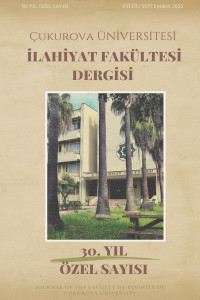ROBERT MERTON VE İŞLEVSELCİLİK KURAMININ TEMEL UNSURLARI
Bu çalışmada, sosyoloji tarihinin önemli simalarından birisi olarak kabul edilen Merton’un sosyoloji disiplinine kazandırdığı temel kavramlar ile bu kavramlar özelinde geliştirdiği işlevselcilik kuramı üzerinde durulmaktadır. Çalışma, Merton’un düşünsel coğrafyasını ve işlevselciliğe dair teorik çözümlemelerini ortaya koymayı hedeflemektedir. Türkçe’de Merton hakkında makale ya da bildiri düzeyinde herhangi bir çalışmaya rastlanmamıştır. Çalışma gerek önemli bir boşluğu doldurulmayı hedeflemesi gerekse kaynak ve bilişsel açıdan ileriki çalışmalara kolaylık sunması cihetiyle önem arz etmektedir. Yöntemsel açıdan çalışma, tasviri ve tahlili bilgiler içeren betimsel-yorumsamacı bir yapıya sahiptir. Çalışmada, bir yandan düşünürün temel kavramları ve işlevselcilik teorisi hakkında genel bir çerçeve sunulurken diğer yandan elde edilen veriler, bağlama uygun güncel örneklerle desteklenerek değerlendirmelerde bulunulmaktadır. Sonuç olaraksa şuna ulaşılmıştır: Merton her ne kadar klasik işlevselci teori içerisinde anılsa da kendi işlevsel paradigmasını oluşturmayı başarmış bir isimdir. İşlevselci paradigmaya kazandırdığı kavramsal açılımlar ile bir yandan teorinin çerçevesini genişletirken öte yandan sosyolojik çözümlemeler açısından teoriyi daha da işlevsel hale getirmiştir.
Anahtar Kelimeler:
Sosyoloji, Merton, İşlevselcilik, Açık İşlev-Gizil İşlev, Bozuk İşlev, İşlevsizlik.
Robert Merton and The Basic Elements of Functionalism Theory
This study focuses on the basic concepts that Merton, who is regarded as one of the important figures in the history of sociology, brought to the discipline of sociology and the theory of functionalism that he developed in the context of these concepts. The study aims to reveal Merton's intellectual geography and his theoretical analyses of functionalism. There is no article or paper on Merton in Turkish. The study is important in the sense that it aims to fill an important gap and facilitate future studies in terms of resource and cognitive aspects. Methodologically, the study has a descriptive-interpretive structure that includes descriptive and analytical information. In the study, on the one hand, a general framework is presented about the basic concepts of the thinker and the theory of functionalism, on the other hand, the data obtained are evaluated by supporting them with current examples appropriate to the context. As a result, it is concluded that: Although Merton is referred to within the classical functionalist theory, he has managed to create his functionalist paradigm. With the conceptual expansions he brought to the functionalist paradigm, he expanded the framework of the theory on the one hand and made the theory more functional in terms of sociological analyses on the other.
Keywords:
Sociology, Merton, Functionalism, Manifest Function-Latent Function, Distorted-function, Dysfunction.,
___
- Akın, M. H. (2022). Çağdaş Sosyoloji Teorileri. cagdassosyolojiteorileri yapı-işlev. Pdf. (ET. 20.06.2022).
- Aydın, K. (2014). “Yapısal İşlevselci Teori ve Toplumsal Tabakalaşma”. Yalova Sosyal Bilimler Dergisi. 5(8). 213-239.
- Britannica (2022). “Robert K. Merton: American Sociologist”. https://www.britannica.com. (ET. 20.03.2022).
- Can, Y. (2004). “Durkheim ve Merton’un Anomi Kuramları Bağlamında Cemaatten Cemiyete Türk Toplumu”. Muhafazakâr Düşünce Dergisi. 1(2). 95-105.
- Cetina, K. (1991). “Merton's Sociology of Science: The First and the Last Sociology of Science?”. Contemprary Sociology. 20(4): 522-526.
- Collins, R. (2015). Sosyolojide Dört Gelenek. (Ü. Tatlıca, Çev.). Bursa: Sentez Yayın ve Dağıtım.
- Coser, Levis. A. (2008). Sosyolojik Düşüncenin Ustaları. (H. Hülür, S. Toker, İ. Mazman, Çev.). Ankara: DE Ki Basım Yayıncılık.
- Deflem, M. (2017). “Merton, Robert K.”. The Wiley Blackwell Encyclopedia of Social Theory içinde. www.researchgate.net. (E.T. 21.06.2022).
- Garfield, E. (1987). The Anomi-Deviant Behavior Connection: The Theories Durkheim, Merton and Srole. Essay on İnformation Scientist. 10(39): 272-281.
- Günerigök, M. & A. İnce (2018). “Bozuk İşlevsellik, Birey ve Bağımlılık.” https:/www.academia.edu. (E.T. 12.05.2022).
- Helm, P. (1971). “Manifest and Latent Function”. The Philosophical Quarterly. 21(52): 51-60.
- Merton, R. (1938): “Social Structure and Anomi”. American Sociolocigial Review. 3(5): 672-682.
- Merton, R. (1945), “Sociolocigial Theory”. American Journal of Sociology. 50(6): 462-473.
- Merton, R. (1948). “The Self-Fulfiling Profhecy”. The Antioch Review. 8(2): 193-210.
- Merton, R. (1957). “Manifest and Latent Function”. Social Theory and Social Structure. Glencoe, IL: Free Press.
- Merton, R. (1968). Social Theory and Social Structure. New York: The Free Press.
- Merton, R. (1968). “The Matthev Effect in Science”. American Association for the Advancement of Science. 195(3810): 56-63.
- Poloma, M. M. (2017). Çağdaş Sosyoloji Kuramları. (H. Erbaş, Çev.). Ankara: Palme Yayıncılık.
- Ritzer, G. & J. Stepnisky. (2012). Çağdaş Sosyoloji Kuramları ve Klasik Kökleri. (H. Ertuna, Çev.). Ankara: De Ki Basım Yayıncılık.
- Slattery, M. (2015). Sosyolojide Temel Fikirler. (Ü. Tatlıcan, G. Demiriz Çev.). Bursa: Sentez Yayın ve Dağıtım.
- Swingewood, A. (2014). Sosyolojik Düşüncenin Kısa Tarihi. (O. Akınhay, Çev.). İstanbul: Agora Kitaplığı.
- Şavran, T. G. (2019). “İşlevselcilik: Parsons Sonrası İşlevselcilikte Gelişmeler”. Modern Sosyoloji Tarihi içinde. (S. Uğur Edit.). Eskişehir: Anadolu Üniversitesi Yayınları.
- Tezcan, M. (1993). Eğitim Sosyolojisinde Çağdaş Kuramlar ve Türkiye. Ankara: Ankara Eğitim Bilimleri Fakültesi Yayınları.
- Wallace, R. A. (2015). Çağdaş Sosyoloji Kuramları: Klasik Geleneğin Genişletilmesi. (L. Elburuz, M. R. Ayas, Çev.). Ankara: Doğu-Batı Yayınları.
- Yayın Aralığı: Yılda 2 Sayı
- Başlangıç: 2001
- Yayıncı: Çukurova Üniversitesi
Sayıdaki Diğer Makaleler
HAÇLI SEFERLERİNDE KÖLE TİCARETİ ÜZERİNE BİR DEĞERLENDİRME
ARAPLARDA HURMANIN YERİ, ÖNEMİ VE İBN VAHŞİYYE’NİN HURMA RİSALESİ’NİN DEĞERLENDİRİLMESİ
EVRİM-DİN ARASINDA ALGILANAN ÇATIŞMA ÖLÇEĞİNİN TÜRKÇEYE UYARLANMASI
PALLE YOURGRAU, SİMONE WEİL, ÇEV. ÜMİD GURBANOV, İSTANBUL: KETEBE YAYINLARI, 2019, 200 SAYFA.
TÜRKİYE’DEKİ MAHALLİ ARAP LEHÇELERİ ÜZERİNE BİR BİBLİYOGRAFYA DENEMESİ
İbrahim ÖZCAN, Ömer ACAR, Ramazan KILIÇ
EBÛ NUVÂS’IN HAMRİYYÂT’INDA ŞARAP KİNAYELERİ
KÂBE’NİN TARİHİ VE ANLAMI ÜZERİNE BAZI TESPİTLER
İSLÂM HUKUKUNDA İRADE BEYANINDA YAPILAN HATANIN SÖZLÜ TASARRUFLARA ETKİSİ İLE İLGİLİ GÖRÜŞLER
